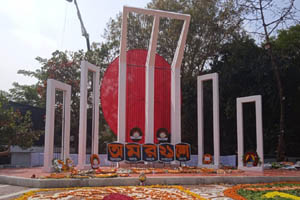 The Amar Ekushey and the International Mother Language Day is being observed across Bangladesh on Monday through paying rich tribute to the memory of the Language Movement martyrs and renewing the call for the proper use of Bangla in all spheres of life.
The Amar Ekushey and the International Mother Language Day is being observed across Bangladesh on Monday through paying rich tribute to the memory of the Language Movement martyrs and renewing the call for the proper use of Bangla in all spheres of life.
Streams of barefooted people from all walks of life filed past the shaheed minars across Bangladesh after placing flowers at the altars from one minute past Thursday midnight, singing ‘Amar Bhaiyer Rakte Rangano Ekushey February’ in chorus.
From the zero hour past Sunday, tens of thousands of people paid glowing tributes to the language heroes who made the supreme sacrifice for establishing Bangla as a state language of the then Pakistan in 1952.
Different organisations and local administrations also arranged book fairs, cultural functions as well as discussions marking the day in all the districts and upazilas.
In Dhaka, thousands of people stood barefoot in queues at the Central Shaheed Minar from the first hour. The crowd increased at abuot dawn.
Wreath was placed on behalf of president Abdul Hamid first at the altar of the Central Shaheed Minar a minute after midnight.
Then, a wreath was placed on behalf of prime minister Sheikh Hasina as the head of the government.
Wreaths were also placed on behalf of Jatiya Sangsad speaker Shirin Sharmin Chaudhury and deputy speaker Fazle Rabbi Miah.
Foreign diplomats and heads of different missions, ruling Awami League, Dhaka University vice-chancellor Md Akhtaruzzaman along with the university teachers, Bangladesh Police among others, also paid tributes to the language martyrs in the first hour of the day.
No sooner the memorial was opened to public after the dignitaries left, the altar of the monument was covered with wreaths.
Breaking the silence of night, mourners mostly dressed in black and white carried placards and banners commemorating the language martyrs, some demanded uses of Bangla at all sphere of life.
Artistes sang patriotic songs and recited poems on the Central Shaheed Minar premises, decorated with Bangla letters against the backdrop of a rising sun.
Central leaders of Bangladesh Nationalist Party led by its secretary general Mirza Fakhrul Islam Alamgir in the morning paid tribute to the martyred language heroes and prayed for eternal peace of their departed souls at Azimpur graveyard where language martyrs Abdul Jabbar, Abul Barkat and Shafiur Rahman were
buried. The party leaders later went to the Central Shaheed Minar where they placed wreaths at about 8:00am.
Almost all political parties, student organisations and socio-cultural and professional groups as well as educational institutions and cross section of people paid tribute to the Language Movement heroes until filing the report at about 1:00pm.
Talking to New Age at the Central Shaheed MInar on Monday morning, Bangladesh Telecommunications Company Limited official Azizur Rahman, said that use of Bangla in the country’s higher education was very low, which was a concern for all.
‘We have to increase the use of Bangla for the next generations to uphold our rich history, tradition and culture,’ he added.
United International University computer science and engineering department professor AKM Muzahidul Islam said, ‘We are anxious about the next generations as they are prioritising the culture of neighbouring countries, leaving our rich culture.’
He said that if such practices are not stopped, it would create confusion whether our next generations would come to commemorate the language movement veterans and martyrs like them.
Md Mizanur Rahman Sojol, a recitation artiste, said that it was unfortunate that the country’s radio, television and even on teleplays were using a mixed language – Bangla and English. ‘I am not against the English language. I prefer either English or Bangla and not a mixture of Bangla and English, ‘ he added.
The national flag was hoisted at half-mast atop government, autonomous and private buildings. The day is a public holiday.
State run Bangladesh Television and Bangladesh Betar as well as private television channels and radio stations are telecasting and airing special programmes while newspapers have published special supplements marking the day.
Black flags were hoisted to pay tribute to the martyrs, including Salam, Jabbar, Rafiq and Barkat, who were killed by police firing into a students’ procession that was brought out, defying ban on procession or gathering near Dhaka Medical College in the city, demanding Bangla as a state language, on February 21, 1952.
Courtesy of New Age Image courtesy: Prabir Das/The Daily Star




















